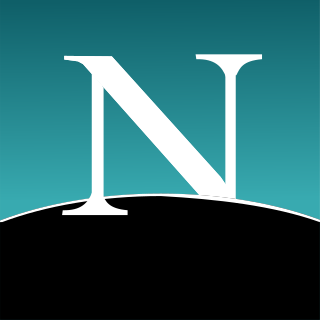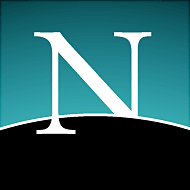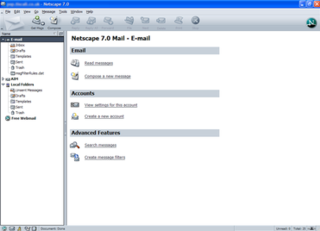
Netscape Navigator was a proprietary web browser, and the original browser of the Netscape line, from versions 1 to 4.08, and 9.x. It was the flagship product of the Netscape Communications Corp and was the dominant web browser in terms of usage share in the 1990s, but by around 2003 its use had almost disappeared. This was partly because the Netscape Corporation did not sustain Netscape Navigator's technical innovation in the late 1990s.
Netscape Communications Corporation was an independent American computer services company with headquarters in Mountain View, California and then Dulles, Virginia. Its Netscape web browser was once dominant but lost to Internet Explorer and other competitors in the so-called first browser war, with its market share falling from more than 90 percent in the mid-1990s to less than 1 percent in 2006. Netscape created the JavaScript programming language, the most widely used language for client-side scripting of web pages. The company also developed SSL which was used for securing online communications before its successor TLS took over.

Gecko is a browser engine developed by Mozilla. It is used in the Firefox browser, the Thunderbird email client, and many other projects.

ChatZilla is an IRC client for Mozilla-based browsers such as Firefox, introduced in 2000. It is cross-platform open source software which has been noted for its consistent appearance across platforms, CSS appearance customization and scripting.

Netscape Communicator is a discontinued Internet suite produced by Netscape Communications Corporation, and was the fourth major release in the Netscape line of browsers. It was first in beta in 1996 and was released in June 1997. Netscape Communicator addressed the problem of Netscape Navigator 3.x being used as both the name of the suite and the browser contained within it by renaming the suite to Netscape Communicator. It included more groupware features intended to appeal to enterprises.
An Internet suite is an Internet-related software suite. Internet suites usually include a web browser, e-mail client, download manager, HTML editor, and an IRC client.

A browser war is competition for dominance in the usage share of web browsers. The "First Browser War" during the late 1990s pitted Microsoft's Internet Explorer against Netscape's Navigator. Browser wars continued with the decline of Internet Explorer's market share and the popularity of other browsers including Firefox, Google Chrome, Safari, and Opera.

Netscape 6 is a discontinued Internet suite developed by Netscape Communications Corporation, and was the sixth major release of the Netscape series of browsers. It superseded Netscape Communicator (4.x), as the release of Netscape Communicator 5 was scrapped. Netscape 6 was the first browser of the Netscape line to be based on another source code: Mozilla Application Suite, an open-source software package from the Mozilla Foundation, which was created by Netscape in 1998.

The following tables compare general and technical information for a number of web browsers.

Netscape Browser is the eighth major release of the Netscape series of web browsers, now all discontinued. It was published by AOL, but developed by Mercurial Communications, and originally released for Windows on May 19, 2005.

SeaMonkey is a free and open-source Internet suite. It is the continuation of the former Mozilla Application Suite, based on the same source code, which itself grew out of Netscape Communicator and formed the base of Netscape 6 and Netscape 7.

Netscape 7 is a discontinued Internet suite developed by Netscape Communications Corporation, and was the seventh major release of the Netscape series of browsers. It is the successor of Netscape 6, and was developed in-house by AOL. It was released on August 29, 2002 and is based on Mozilla Application Suite 1.0.
The history of the Mozilla Application Suite began with the release of the source code of the Netscape suite as an open source project. Going through years of hard work, Mozilla 1.0 was eventually released on June 5, 2002. Its backend code base, most notably the Gecko layout engine, has become the foundation of a number of applications based on Mozilla, including the Mozilla Foundation's flagship product Mozilla Firefox and Mozilla Thunderbird. While the suite is no longer a formal Mozilla product, its development and maintenance is continued as the SeaMonkey community project.

The Mozilla Application Suite is a discontinued cross-platform integrated Internet suite. Its development was initiated by Netscape Communications Corporation, before their acquisition by AOL. It was based on the source code of Netscape Communicator. The development was spearheaded by the Mozilla Organization from 1998 to 2003, and by the Mozilla Foundation from 2003 to 2006.

Flock is a discontinued web browser that specialized in providing social networking and Web 2.0 facilities built into its user interface. Earlier versions of Flock used the Gecko HTML rendering engine by Mozilla. Version 2.6.2, released on January 27, 2011, was the last version based on Mozilla Firefox. Starting with version 3, Flock was based on Chromium and so used the WebKit rendering engine. Flock was available as a free download, and supported Microsoft Windows, Mac OS X and, at one time, Linux as well.

The Netscape web browser is the general name for a series of web browsers formerly produced by Netscape Communications Corporation, a former subsidiary of AOL. The original browser was once the dominant browser in terms of usage share, but as a result of the first browser war, it lost virtually all of its share to Internet Explorer.

Netscape Navigator 9 is a discontinued web browser that was produced by the Netscape Communications division of parent AOL, first announced on January 23, 2007. It was the ninth major release of the Netscape line of browsers. After AOL outsourced the development of Netscape Browser 8 to Mercurial Communications in 2004, Netscape Navigator 9 marked the first Netscape browser to be produced in-house since the Netscape 7 suite. It also saw the return of the classic Navigator name, which was previously used during Netscape's heyday between versions 1.0 and 4.08 in the 1990s. Netscape Navigator 9 is based on Mozilla Firefox 2.0.

Netscape Mail and Newsgroups, commonly known as just Netscape Mail, was an email and news client produced by Netscape Communications Corporation as part of the Netscape series of suites between versions 2.0 to 7.2. In the 2.x and 3.x series, it was bundled with the web browser. In the 4.x series, it was rewritten as two separate programs known as Netscape Messenger and Netscape Collabra.
The following is a comparison of RSS feed aggregators. Often e-mail programs and web browsers have the ability to display RSS feeds. They are listed here, too.

Mozilla is a free software community founded in 1998 by members of Netscape. The Mozilla community uses, develops, spreads and supports Mozilla products, thereby promoting exclusively free software and open standards, with only minor exceptions. The community is supported institutionally by the not-for-profit Mozilla Foundation and its tax-paying subsidiary, the Mozilla Corporation.













